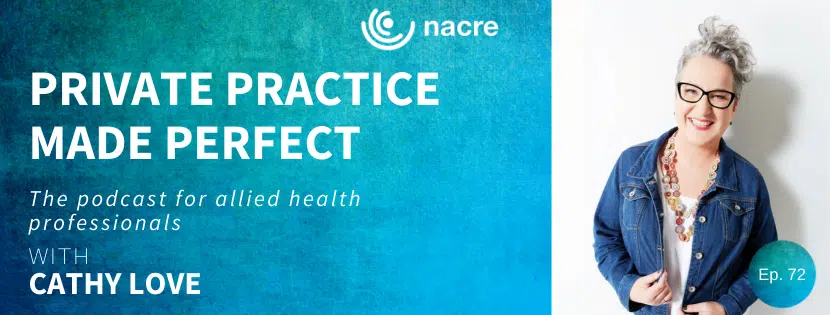I get asked time and time again, “How do I learn about the business side of things?” What’s more accurate is allied health business owners telling me, “I’ve never learned the business side of things”. It makes complete sense, they’re different sides of the same coin.
When I was at university doing my occupational therapy degree, there was not a single sniff of any sort of business education. But, the good news is more and more universities are recognising the need to build business awareness into the final year of the undergraduate courses.
This will not only benefit those coming through the schools now, but it’ll also benefit existing allied health business owners. When recruiting, you’ll have your pick of the bunch of graduates with some great business understanding and business language already under their belts.
To help you improve on the business side of things, I’ve come up with my top 10 tips.
Subscribe here: Apple Podcast, Stitcher, Subscribe on Android, Player.fm, RSS
Business learning tips
1 – Inform yourself
My number one thought, and perhaps the most obvious, is to educate yourself. There are some incredible books out there for you to read as a start.
I often post my favourites on my Facebook page, so if you want a few ideas, check that out. My book of 2018 was Gary Keller’s The ONE Thing; it was life-changing. You can also Google top 10 business books to read for an idea of where to start.
Don’t have time for reading? Go to Audible and listen on your commute to and from work, or as you’re doing other things around the office or house. There’s also the great option of Blinkist, an online program that provides a summary of the book so you can decide whether it’s something you may want to purchase at a later stage.
2 – Fill your ears
As you know, I love a podcast, so I encourage you to listen to a range of them. Listen to a podcast about people’s life stories, about the future, about technology, about finance, about marketing, about mindset, mind shift, and about energy management and more. Once again, I’ll share my favourites on the Facebook page.
3 – Engage online
Number three is also an online-based tip – engaging appropriately with the many and varied Facebook groups that are around. Here in Australia, we’ve got some really good ones to choose from including Disability Community of Practice, and a range of NDIS provider groups too.
Practice Made Perfect is the one I’m fortunate enough to oversee. I find I learn something every day from the generosity and spirit of that particular group.
But don’t just sit down and observe. Throw yourself in, ask a question and contribute if you have something up your sleeve that might help someone else. It is all for the greater good. And remember, there is no such thing as a dumb question. Ask away and you’ll be delighted at the response, I am sure.
4 – Participate
This one ties into the above tip – participate in various association groups. But don’t just stick to online, attend events, complete courses, sign up for webinars and, of course, join their Facebook groups.
5 – Build your team
Number five is to build an advisory team around you. That could include your lawyer, your coach, your accountant, your bookkeeper, your mentors; whoever you need to build rhythms and habits about how to run your business successfully and effectively.
6 – Invest, invest, invest
I encourage you to book yourself in for some programs, whether it’s a local business program, or a Business Advantage Membership.
We’re bringing a new product to the market in 2019, the Business Accelerator Mastermind. It will be a structured, paced course over a couple of months with a great group of people and advisers and, access to me as well.
7 – Ask for help
Talking to people, especially people who may be a little bit ahead of you in the allied health business game, is a great way to find a solution to your problems or concerns. Ask your colleagues, friends, family and even me, questions that are running around in your mind.
8 – Block out your diary
I think it’s incredibly important to block out a minimum of four hours per week dedicated purely to business development. Make it your newest commitment.
9 – Build your habits
Developing really good, solid habits will help you in all aspects of business. That could be pulling reports at the end of each week, and at the end of the month. This may be part of your business development activities but it also might be something that you have to consciously practice.
10 – Collaborate
Your customers are number one priority so collaborate with them. Be bold and brave and ask them for feedback, or as I like to call it, ‘feed forward’. By doing this, you’ll be ahead of the game by knowing what it is you’re doing well. You’ll also be able to find out what your customers might want that you’re not yet giving them. Bring their ideas in, co-design some new programs, and measure their success.
My bonus tip for you is to just be patient. Just as it’s taken years and years for you to hone your clinical skills, it is also going to take time, love and investment to develop your management and leadership skills.
Commit wholeheartedly that you will become the business owner of your future dreams and you’ll get there.







